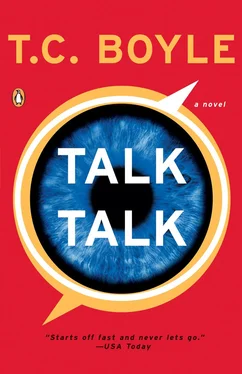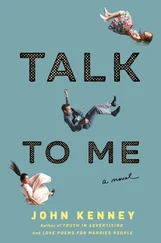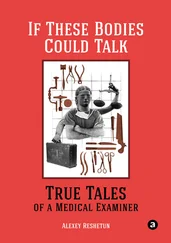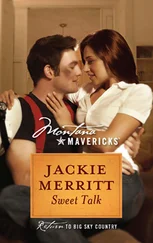Until she mentioned it, he hadn't realized how hungry he was. They hadn't stopped, even for a Coke, since breakfast (technically lunch, and he had a queasy recollection of grilled cheese, fries and a side salad with a dollop of very old ranch dressing), pushing on through just to get it over with, as if the drive were a prizefight and they were punch-drunk and reeling and praying for the bell at the end of the fifteenth round to release them. He heard himself say, “Sure. Yeah. But don't go to any trouble-”
“Oh, it's no trouble,” she assured him, reaching for the telephone on the table beside her. “I'll just call Aldo's and have them send something up. You do eat meat, right?” she asked, looking to Bridger, and then, without waiting for an answer, she turned to Dana. “Is the osso buco okay with you? You always liked osso buco.”
Dana didn't respond-she wasn't even looking.
“And soup. Anybody want soup? They do a nice pavese-you want soup, Bridger? Salad? Anything to start-crostini? Calamari, maybe?”
After dinner, which they ate off of heavy china plates balanced on their knees while sipping what Dana's mother kept calling “a really nice Bardolino,” Dana made a show of taking the things out to the kitchen to wash up. Bridger had risen from his chair in a half-hearted attempt to intercede, signing “Let me do it,” but Dana ignored him even as her mother sang out, “No, no, you sit down, I want to talk to you.” She had a coquettish look on her face as she added, “So we can get acquainted. All right? You don't mind that, do you? Getting acquainted?” And then she rose and refilled his glass, murmuring, “And have some wine. It's good for you. Good for the heart.”
The first thing she did was inform him of the grim statistics-he knew, didn't he, that ninety percent of the deaf married their own kind and that of the ten percent who married into the hearing world, ninety percent of “them” wound up divorced?
“Yes,” he said, leaning back in the easy chair and taking a moment to wet his lips with the wine, “that was one of the first things Dana told me after we met. After we started dating, I mean.”
“Not a happy number.”
“No.” The Bardolino had gone to his legs-he'd already drunk too much-and he felt paralyzed from the waist down. Not that he was uncomfortable, not anymore. Or not especially. The place was growing on him-so was Dana's mother. The food had been good, great even, still hot when she artistically slipped one item after another from the sealed Styrofoam boxes onto the plates, and the wine was whispering its secrets to him in a way that made the tensions of the road fade away to nothing.
Dana's mother was leaning forward, both elbows braced on her knees. “So you're not the type that's easily daunted-and you love her. You love my daughter. Or am I wrong?”
He could feel the wine rising now all the way up through his torso to his face, which was hot, and his forehead, which was on fire. “Yes,” he said, “or no, I mean-you're not wrong,” and he tipped back the glass and drained it.
“Because,” she went on as if she hadn't heard him, “as beautiful and independent and smart as she is-and she “is” brilliant, I hope you realize that-there are problems, little frustrations that add up, you know what I mean?” Her eyes were shaped like Dana's, closer to round than oval, and they were the same deep rich color suspended somewhere between brown and gold; when he held her gaze, when he looked into them, he saw Dana just as surely as if he were re-creating her on his computer screen. From somewhere below them, distantly, there was the sound of a siren. “She can be stubborn,” she said.
From the kitchen, down the hall and two rooms away, there was the thump and clatter of things being shifted around, a sudden crash, a curse. “What?” he said, distracted. And drunk. Drunk for sure.
“She can be stubborn. But you already know that.”
He shrugged. This was neither the time nor place for a critique.
Vera-could he call her Vera? — seemed deflated suddenly. Her own wineglass was empty and she rose to refill it and gestured toward him, but he laid his palm over the rim of the glass and shook his head. Her face composed itself. She sat heavily. For a long moment she said nothing and he was beginning to think the interview was over when she waved her glass and said, “Cochlear implants. For example. Take cochlear implants.”
He'd never heard the term before he took his Sign language course. It was the first night, and one of the students wanted to know why the deaf didn't just go out and get implants and dispense with Sign altogether. The teacher-she was married to a physicist who was prelingually deaf and used a combination of speech, lip-reading and Sign to communicate-pointed out that not everyone was a candidate for implants, for one thing, depending on the extent and pathology behind their hearing loss, and that among those who were, the results were often mixed. She went on to explain the procedure-the patient would have a receiver and electrodes surgically embedded in the mastoid bone and cochlea in order to pick up sounds from a tiny microphone located behind the ear. In the best-case scenario, these sounds would be transmitted to the auditory nerve and the patient would have some measure of hearing restored, perhaps enough to allow him to function almost normally in the hearing world, especially if he'd lost his hearing later in life. For the rest, it might be enough to improve lip-reading and enable them to talk on the telephone, hear alarms and car horns, that sort of thing. It wasn't a magic bullet.
“You know about cochlear implants?”
He nodded.
“Well, Dana… and this really frustrated me and her father too, and maybe frustrated is too mild a word because I was ready to scream”-she paused to give him a brittle smile-“but of course Dana wouldn't have heard me no matter if I screamed all day and all night for the rest of my life. But the point is she refused to be evaluated. Wouldn't even go to the otologist, not even to find out if she was physically capable of improvement-wouldn't hear of it.” Another smile. “Listen to me. Just the way we talk, the expressions we use-”
“I hear you,” he said, and for a moment she looked startled. Then her features rearranged themselves again and she slapped the arm of the chair and they were both laughing, the siren playing distantly beneath them, keening as if to split the night in two.
ALL THE RIVER TOWNS looked the same, block after block of rambling top-heavy old houses in various states of disrepair, derelict factories sunk into their weed lots, the unemployed and unemployable slouching along the cracked sidewalks while the sumac took hold and the ceremonial parking meters glinted under the sun. Peterskill was no different. Unless maybe it was worse. She'd been here before, when she was a girl-her parents had rented a bungalow on Kitchawank Lake one summer and every Saturday they'd take the family out to a restaurant in the heart of downtown Peterskill, her father irrepressible, shouting “Cucina Italiana, the real deal,” mugging and rubbing his abdomen in broad strokes till she and her brothers would break up laughing-but that was twenty years ago and nothing looked even vaguely familiar to her now. The lake she remembered. She'd had a canoe to fool around in that summer-it had come with the house-and she remembered taking it into the little coves on the far shore whenever she could pry it away from her brothers, and she would just drift sometimes, reading, nibbling at a sandwich, feeling the breeze on her face and taking in the intoxicating scent of the lake, the scent of decay and renewal and the strangely sweet odor that lingered when the speedboats had gone.
Читать дальше












